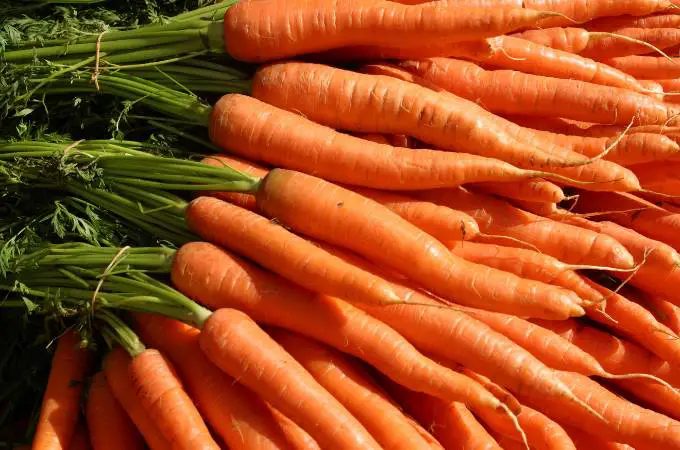
Raising chickens is an endeavor that requires knowledge and attention to their dietary needs. For those who care for these birds, a common query is: “Can chickens eat carrots?” This article aims to thoroughly explore the answer and provide chicken owners with practical advice on including carrots in their flock’s diet.
Understanding Chickens’ Dietary Needs
Chickens are natural foragers, meaning in the wild, they would eat a varied diet consisting of seeds, insects, fruits, and vegetables. In a domestic setting, their diet often consists of commercial feed, which is formulated to meet their nutritional requirements. However, adding fresh produce like carrots can enhance their nutrient intake and provide environmental enrichment.
The Nutritional Benefits of Carrots for Chickens
Carrots are a healthy addition to a chicken’s diet. Here’s what they offer:
- Beta-Carotene: This antioxidant converts to vitamin A, which is vital for maintaining healthy vision and immune response.
- Fiber: Essential for digestive health, helping to keep the digestive tract running smoothly.
- Vitamins: Carrots are a good source of several vitamins, including C, K, and B-complex, which support various bodily functions.
- Minerals: They provide minerals like potassium, which is important for heart health, and manganese, which is needed for bone development and wound healing.
The Importance of Vitamin A for Chickens
Vitamin A is particularly important for chickens. A deficiency can lead to several health issues, including poor growth, weak eggshell quality, and increased susceptibility to infections. Since chickens convert beta-carotene from carrots into vitamin A, it’s an excellent way to prevent these problems.
How to Feed Carrots to Chickens Safely
When introducing carrots to your chickens, it’s vital to do it safely:
- Proper Preparation: Peel carrots to remove any residual pesticides (if not organic) and chop them into small, bite-sized pieces to prevent choking.
- Feeding Technique: Offer chopped carrots on a clean surface or mix them into their regular feed to encourage them to try the new food.
- Monitoring: Watch your chickens as they eat to ensure they are handling the new treat well and not experiencing any issues like choking or crop impaction.
Cooking Carrots for Chickens
While raw carrots are beneficial, cooking them can make the beta-carotene they contain even more accessible for chickens to absorb. Light steaming is the best method as it softens the carrots without leaching out too many nutrients.
Variety is the Spice of Life: Diversifying Your Chicken’s Diet
A varied diet is essential for chickens. While carrots are a great treat, they should be fed alongside other vegetables and fruits to ensure a range of nutrients. Consider introducing leafy greens, squash, apples, and berries, always in moderation and properly prepared to avoid health issues.
Tips for a Balanced Chicken Diet:
- Primary Feed: Make sure the majority of your chickens’ diet is a high-quality commercial poultry feed appropriate for their age and purpose (laying or meat production).
- Complementary Treats: Use carrots and other treats as supplements to their primary feed, not as replacements.
- Grit: Since chickens don’t have teeth, they need grit to help grind down their food in their gizzard.
You might also like: Can Chickens Eat Celery?

The Risks of Overfeeding Carrots to Chickens
Though nutritious, carrots should not be overfed to chickens due to:
- Imbalanced Nutrition: Too many carrots can lead to an excess of certain nutrients while causing a deficit in others.
- Digestive Distress: Overconsumption can lead to digestive issues, as chickens need a balanced diet for optimal gut health.
The Joy of Growing Carrots for Your Chickens
Growing your own carrots can be a rewarding experience and an excellent source of fresh treats for your chickens. It allows you to control the use of chemicals and ensure the freshest possible produce.
How to Grow Chicken-Friendly Carrots:
- Choose the Right Variety: Some carrot varieties are more suitable for different climates and soil types.
- Prepare the Bed: Loose, well-drained soil is crucial for carrot development.
- Sow the Seeds: Plant carrot seeds in the early spring or fall for a continuous harvest.
- Maintenance: Keep the carrot tops watered and weed regularly.
Common Questions About Feeding Carrots to Chickens
Let’s address some typical inquiries chicken owners have:
Can I feed my chickens carrot peels?
- Yes, carrot peels are safe for chickens as long as they are washed to remove any pesticides or contaminants.
Do carrots affect the color of egg yolks?
- The beta-carotene in carrots can deepen the yellow and orange pigments in the yolks.
Are organic carrots better for my chickens?
- Organic carrots have the advantage of being grown without synthetic pesticides and fertilizers, which can be better for your chickens and the environment.
Best Practices for Introducing Carrots into a Chicken’s Diet
To introduce carrots effectively:
- Start Small: Begin with a small amount to allow their digestive system to adjust.
- Observe: Watch for any adverse reactions or changes in behavior.
- Consistency: Once you’ve determined they’re safe, consistently provide carrots in moderation as part of their diet.
Carrot Treat Ideas for Happy Chickens
Incorporating carrots into your chickens’ diet can be a fun and interactive process. Here are some ideas to get you started:
- Hanging Carrot Treats: Suspend carrots from a string in the chicken coop to create a pecking toy that promotes exercise and entertainment.
- Frozen Carrot Pops: Freeze chopped carrots in water during the hot months to give your chickens a refreshing and nutritious cool-down treat.
- Carrot Top Greens: Don’t discard the greens on top of carrots; these too can be a nutritious snack for your chickens.
You might also like: What Can Chickens Eat?
Understanding the Seasonal Benefits of Carrots for Chickens

Carrots can be particularly beneficial during different seasons. In winter, when fresh green forage may be less available, carrots provide an important source of nutrients. In summer, frozen carrots can help chickens cool down and stay hydrated.
The Colorful Diet: Does Carrot Consumption Change Feather Pigmentation?
While carrots can influence the pigmentation of egg yolks, they are less likely to alter feather coloration. However, over time, a diet rich in varied fruits and vegetables can contribute to a more vibrant and glossy plumage, indicating good health.
Partnering with Nature: The Role of Carrots in a Natural Chicken Diet
By introducing carrots, you’re aligning your chickens’ diet closer to what they might encounter in a natural setting. It encourages natural behaviors, such as foraging and pecking, which are crucial for mental and physical health.
Encouraging Natural Foraging Behaviors
Scattering small pieces of carrot around your chicken run can encourage foraging, which is a key part of a chicken’s natural behavior. This activity not only provides them with physical exercise but also mental stimulation.
Frequently Asked Questions Expanded
Q: Can chickens eat cooked carrots?
A: Yes, chickens can eat cooked carrots, and in some cases, it can make the carrots easier to digest.
Q: How often should I feed carrots to my chickens?
A: Treats, including carrots, should not make up more than 10% of your chickens’ diet. A few small pieces per chicken a couple of times a week is sufficient.
Q: Are there any chickens that shouldn’t eat carrots?
A: Most chickens can safely eat carrots. However, if you have chickens with underlying health conditions, it’s best to consult with a veterinarian.
Balancing Carrots with Other Dietary Elements
While carrots are nutritious, it’s important to balance them with other aspects of the chickens’ diet. Ensure that your chickens are also getting enough protein, which is crucial for egg production and overall health. This can come from their feed or from supplemental sources like mealworms or small amounts of cooked meat.
Final Thoughts
To summarize, carrots can be a beneficial treat for chickens when introduced properly and fed in moderation. They provide essential nutrients that can contribute to the health of your flock and encourage natural behaviors that improve their quality of life. By offering carrots along with a balanced diet and plenty of clean water, you can enjoy the sight of healthy, happy chickens bustling about in their coop or run.
Contents
- 1 Understanding Chickens’ Dietary Needs
- 2 The Nutritional Benefits of Carrots for Chickens
- 3 How to Feed Carrots to Chickens Safely
- 4 Variety is the Spice of Life: Diversifying Your Chicken’s Diet
- 5 The Risks of Overfeeding Carrots to Chickens
- 6 The Joy of Growing Carrots for Your Chickens
- 7 Common Questions About Feeding Carrots to Chickens
- 8 Best Practices for Introducing Carrots into a Chicken’s Diet
- 9 Carrot Treat Ideas for Happy Chickens
- 10 Understanding the Seasonal Benefits of Carrots for Chickens
- 11 The Colorful Diet: Does Carrot Consumption Change Feather Pigmentation?
- 12 Partnering with Nature: The Role of Carrots in a Natural Chicken Diet
- 13 Frequently Asked Questions Expanded
- 14 Balancing Carrots with Other Dietary Elements
- 15 Final Thoughts










